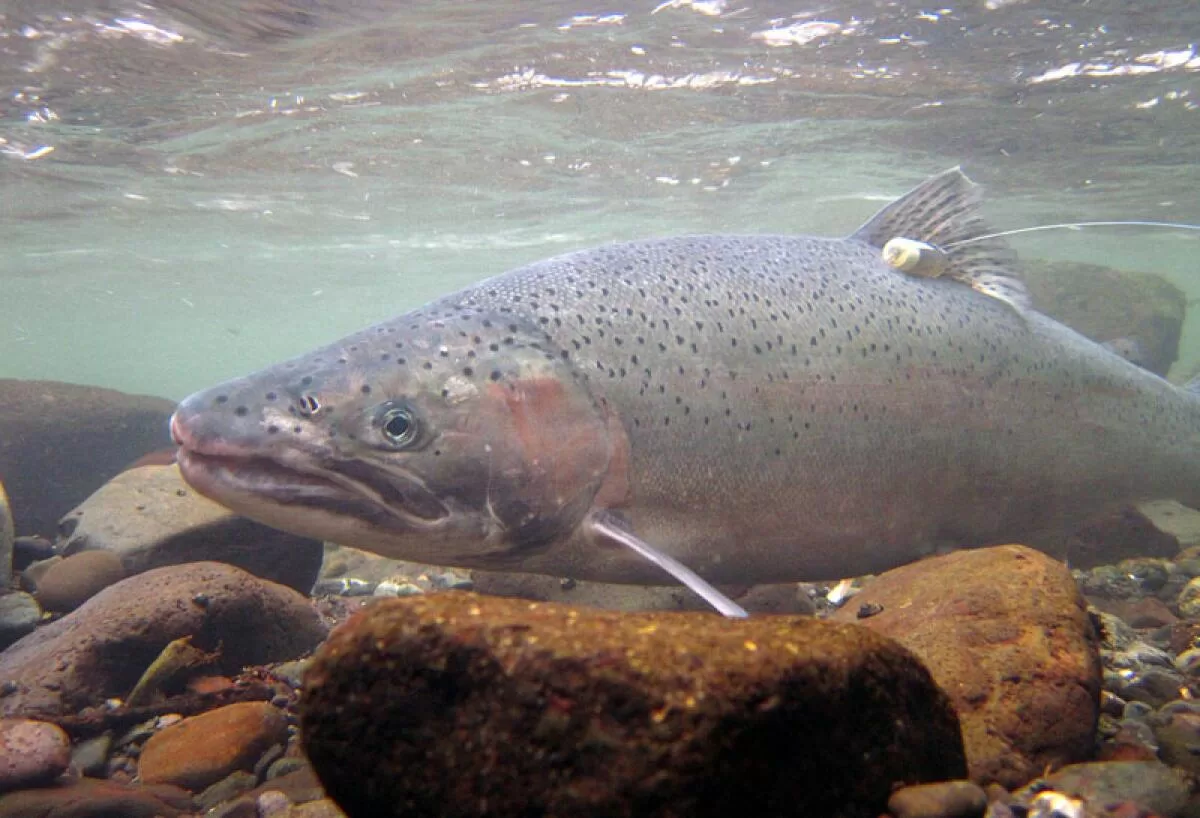In March, there was excitement when one steelhead was spotted in the Santa Ynez River basin in Santa Barbara County.
“One fish where 25,000 used to be,” says Russell Marlow, south coast project manager for California Trout, a nonprofit activist organization.
“While I celebrate the ability of one fish to exist, it’s a giant red flag.”
Three adult steelhead were sighted five years ago in the Santa Clara River that flows between Santa Clarita and Oxnard, Marlow adds.
Only 177 Southern California steelhead have been seen in the last 25 years, he says.
Endangered? They’re practically extinct.
“I get a lot of students from Southern California and many have no idea about these beautiful creatures that are unique to the region. They’ve never heard of them before,” says Andrew Rypel, a UC Davis fish biologist.
(John McMillan/NOAA/Northwest Fisheries Science Center)
“This is a species that’s really on the clock toward extinction. If things continue, it may last only 30 to 50 years — and maybe that’s even generous.”
That’s sad, especially for a guy like me who’s old enough to remember the excitement of steelhead spawning runs up the Ventura River. That was prior to so much human “progress.”
The steelhead is a rainbow trout that — unlike its freshwater little brother — grows up in the ocean. And it grows up really big, to 2 or 3 feet.
The steelhead is like its cousin, the salmon. They’re both hatched upstream and, as kids, fight their way past bullies down to the ocean, where they fatten up on marine nutrients not available in freshwater. Then they battle their way back upriver to their original hatching waters and spawn a new generation.
Unlike salmon, however, steelhead don’t die after spawning. These superfish live on, beating it back to sea and returning once or twice more to mate and reproduce.
That’s the way nature designed it and how it worked for thousands of years until humans mucked it up — mostly as we overpopulated California after World War II.
We built dams that blocked spawning runs, diverted the fish’s water for agriculture and urban use and destroyed estuaries with development — all the while saying the right things and kidding ourselves it wouldn’t harm the fish. Right!
I got hooked on steelhead as a little kid watching my dad pluck them out of the Ventura River. We had a small orange ranch in Ojai on a bluff overlooking the river canyon.
I fondly remember one late afternoon when my brother and I tagged along with our dad and his best friend, Bill — a former hunting and fishing guide on the Smith River near the Oregon border — as they deftly cast spinners into a picturesque pool with their fly rods.
This was before fishing rods were made of fiberglass, let alone graphite. Dad’s was a beautifully varnished split bamboo.
Twice, he and Bill maneuvered leaping steelheads into nets. And somewhere at home in a shoebox of treasures is a prized photo of my father and his fishing buddy holding up the two gorgeous natural wonders.
Back then, winter steelhead runs were a festive time for anglers along the Ventura River.
Then one day in 1947 I was with my dad in the front yard and heard a loud boom.
“What’s that?” I asked. It was dynamite. “They’re building a dam but it’s not going to work,” Dad replied. “Why not?” “It’s just going to fill up with sand and dirt.”
Dad had only an eighth-grade education, but he knew nature — and coastal stream flows.
Sure enough, the reservoir behind Matilija Dam filled with sediment in a few years and has been useless and an embarrassing eyesore for a long time. Worse, it blocked steelhead from their spawning waters in Matilija Creek, a Ventura River tributary.
The final death knell for Ventura River steelhead was construction of the larger Casitas Dam near Oak View in 1959. That reservoir is partly fed with Ventura River water, siphoned through a canal below Matilija Dam.
A few weeks ago I revisited Ojai. There was a strong river flow down to the diversion canal. After that, the stream was a trickle. It’s doubtful any steelhead could have swum in that water.
Many local people and fish enthusiasts — like California Trout — have been trying to tear down Matilija Dam for years and reopen the spawning grounds. The reservoir is 99% filled with crud. But it could be a $200-million project.
In the Legislature, a $10-billion “climate bond” is being talked about for the November ballot. It would include $100-million for dam removal.
But that bond is in competition with other proposals for housing and education. And everyone is freaked out because Gov. Gavin Newsom’s $6.4-billion mental health bond barely squeaked past voters in the March election. There’s justifiable concern that voters might not be ripe for spending more borrowed money.
“We have to go into this with our eyes wide open,” says Sen. Ben Allen (D-Santa Monica), who’s pushing a climate bond.
But for any steelhead to survive in the Ventura River, that dam has to be smashed and less water diverted.
The Santa Clara and Santa Ynez rivers also once teemed with steelhead. And they likewise need lots of attention to save the majestic fish.
The endangered species law gives the state tools to act. It has plans and plenty of talk. But little apparent action.
Can a few dozen native fish survive and propagate in watersheds occupied by 22 million humans? It’s possible. But it doesn’t seem to fit human nature.
Too bad. We’ve lost a prized asset — the kind that once lured people to California.
